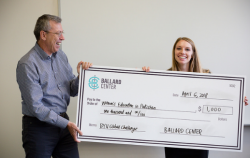Doing Good Better with Y-Prize: Problem Mastery
PROVO, Utah – Jan 29, 2019 – While as a student at BYU-Idaho, Madeline Steele, a public health major, stumbled upon the one and only social innovation class at offered on campus. Intrigued by the ad for the class that promised she could change the world, Steele enrolled in the class and loved what she learned.
Steele eventually heard about the Ballard Center at BYU, which offered more classes and programs than available at BYU-Idaho. Feeling compelled to get involved in the field of social innovation, she applied to transfer to BYU, mentioning the Ballard Center in her application.
Since her acceptance to BYU, Steele has taken several social innovation classes from the Ballard Center and currently works as a teaching assistant for MSB 375, Social Innovation: Do Good Better. She also works as the program coordinator for Y-Prize Problem Mastery.
“The Y-Prize: Problem Mastery program gives people an opportunity to understand a problem in its entirety,” Steele says. “I love that students get to completely dive into what is happening.”
Y-Prize: Problem Mastery students become an expert on a social issue of their choice and present their findings in a competition format. Teams explore a social problem that they are personally passionate about by identifying causes and consequences of a problem, how current solutions are attempting to be implemented, and what gaps might exist between the problem and solution landscape. Students strive to understand why the social problem still exists despite efforts to reduce or eliminate the problem.
For example, the winning team in 2017 researched the topic of harmful rice farming practices in Vietnam. The team found that farmers typically burn the rice straw waste, which contributes to air pollution and health issues within communities. Fargreen, a Vietnamese business, currently uses the rice straw to grow gourmet mushrooms, which is an existing solution to the problem. Fargreen sold the mushrooms for a significant profit while also improving the environment. A gap in the system was that no Vietnamese legislation is in place to prohibit rice straw burning.
Presentation requirements include a paper with a maximum of two thousand words and a visual that summarizes the team’s findings in a concise way. Most students create an infographic to summarize the information.
However, the competition is not solutions based. Students are becoming an “apprentice to a social problem” by doing a deep dive on why a particular issue hasn’t been solved rather than coming up with solutions themselves.
The judging panel is generally made up of BYU professors and industry experts from a wide variety of backgrounds and disciplines, including the humanities, social work, life sciences, and business. A total of $6,000 prize money is divided between the top three winning teams.
This year, competition requirements are focusing on primary research such as interviews and surveys in order to comprehensively understand the problem. Steele helped students narrow down a social issue that was submitted prior January 2019. The competition takes place near the end of winter semester.
Topics covered by students in the past include women’s education in Pakistan, forced labor trafficking in Hong Kong, and many others.
“There’s so much good we can do that isn’t harmful,” said Steele while reflected on her experience with social innovation. “Helping others to help themselves is the ultimate goal. It’s possible to create a change, do it well, and make money doing it. There is always something more we can do.”
For more information about Y-Prize: Problem Mastery, please visit problemmaster.byu.edu.
Media Contact: Alicia Gettys (801) 422-9009
Writer: Heidi Phelon




